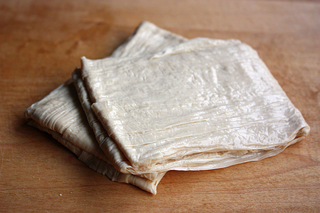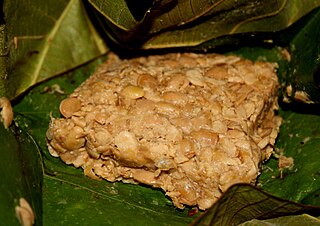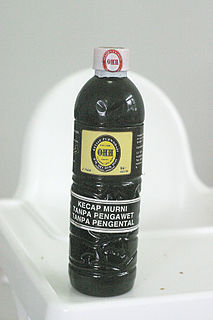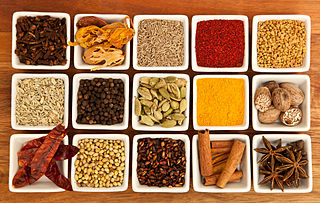
Seitan is a food made from gluten, the main protein of wheat. It is also known as miàn jīn, milgogi, wheat meat, gluten meat, vital wheat gluten or simply gluten. It is made by washing wheat flour dough with water until all the starch granules have been removed, leaving the sticky insoluble gluten as an elastic mass, which is then cooked before being eaten.

Textured or texturized vegetable protein (TVP), also known as textured soy protein (TSP), soy meat, or soya chunks is a defatted soy flour product, a by-product of extracting soybean oil. It is often used as a meat analogue or meat extender. It is quick to cook, with a protein content comparable to certain meats.

Breakfast sausage is a type of fresh pork sausage usually served at breakfast in the United States. In the United States, the predominant flavorings used for seasoning are black pepper or sage. There are also varieties seasoned with maple syrup or cayenne pepper. Some breakfast sausage is flavored with cured bacon.

Amazake is a traditional sweet, low-alcohol Japanese drink made from fermented rice. Amazake dates from the Kofun period, and it is mentioned in the Nihon Shoki. It is part of the family of traditional Japanese foods made using the koji mold Aspergillus oryzae, which also includes miso, soy sauce, and sake.

Tofu skin, beancurd skin, beancurd sheet, or beancurd robes is a food product made from soybeans. During the boiling of soy milk, in an open shallow pan, a film or skin forms on the liquid surface. The films are collected and dried into yellowish sheets known as tofu skin. Since tofu skin is not produced using a coagulant, it is not technically a proper tofu; however, it does have similar texture and flavor to some tofu products.

Kinema is an indigenous fermented soybean food prepared mostly by the Limbu and Yakkha of the Eastern Himalayan Region, what is now Eastern Nepal and Darjeeling, Kalimpong and Sikkim regions of India.

Mildred Mathilda Lager was an American pioneer of natural foods and health food.

Wotou or wowotou, also called Chinese cornbread, is a type of steamed bread made from cornmeal in Northern China.

Sweet soy sauce is a sweetened aromatic soy sauce, originating in Indonesia, which has a darker color, a viscous syrupy consistency and a molasses-like flavor due to the generous addition of palm sugar or jaggery. Kecap manis is widely used with satay. It is similar to, though finer in flavor than, Chinese Tianmian sauce (tianmianjiang). It is by far the most popular type of soy sauce employed in Indonesian cuisine, and accounts for an estimated 90 percent of the nation's total soy sauce production.

Vegetable soup is a common soup prepared using vegetables and leaf vegetables as primary ingredients. It dates to ancient history, and is a mass-produced food product in contemporary times.
La Loma Foods, formerly named Loma Linda Food Company and Loma Linda Foods, and with products presently branded under the name Loma Linda and Loma, is a former food manufacturing company that produced vegetarian and vegan foods. It is presently an active brand of vegetarian and vegan food products produced and purveyed by the Atlantic Natural Foods Company of Nashville, North Carolina. Loma Linda Foods began operations in 1905 under the name The Sanitarium Food Company and was owned by the Seventh-day Adventist Church until 1990.

Indian relish is a spicy relish used as a condiment or side dish. It consists of variety of vegetables and fruit that can include chopped bell peppers, sweet onion, garlic, tomatoes, sour apples, mustard, cloves, white wine vinegar, crushed red pepper flakes, ginger, and sugar. Recipes for Indian relish started appearing in cookbooks during the 1700s. Indian relish was imported from India and became popular in England and Scotland during the 18th century.

Ten Talents is a vegetarian and vegan cookbook originally published in 1968 by Rosalie Hurd and Frank J. Hurd. At the time, it was one of the few resources for vegetarian and vegan cooks. The cookbook promotes Christian vegetarianism and a Bible-based diet, in keeping with teachings of the Seventh-day Adventist Church. By 1991, the 750-recipe cookbook was entering its 44th printing and had sold more than 250,000 copies. An expanded edition with more than 1,000 recipes was issued in 2012.

The Farm Vegetarian Cookbook is a vegan cookbook by Louise Hagler, first published in 1975. It was influential in introducing Americans to tofu, included recipes for making and using tempeh and other soy foods, and became a staple in vegetarian kitchens.

Ellen Goodell Smith was an American hydropathic physician, vegetarian and writer.

Otto Carque was a French–American businessman, fruit grower, naturopath, raw foodist, vegetarian and writer. He was the first to use the term natural food.
William Roy Shurtleff also known as Bill Shurtleff is an American researcher and writer about soy foods. Shurtleff and his former wife Akiko Aoyagi have written and published consumer-oriented cookbooks, handbooks for small- and large-scale commercial production, histories, and bibliographies of various soy foods. These books introduced soy foods such as tofu, tempeh, and miso on a wide scale to non-Asian Westerners, and are largely responsible for the establishment of non-Asian soy food manufacturers in the West beginning in the late 1970s. In 1980, Lorna Sass wrote in The New York Times, "The two people most responsible for catapulting tofu from the wok into the frying pan are William Shurtleff and Akiko Aoyagi.” In 1995, Suzanne Hamlin wrote in The New York Times, “At the turn of the century there were two tofu suppliers in the United States. Today there are more than 200 tofu manufacturers...and tofu can be found in nearly every supermarket."

Lenna Frances Cooper was an American dietitian and co-founder of the Academy of Nutrition and Dietetics. She has been called “a pioneer in vegetarian nutrition and dietetics.”
Wushi Zhongkuilu is a late 13th century Medieval Chinese culinary work on household cookery written by an anonymous author from the Pujiang region known only as "Madame Wu". It is the earliest known culinary work written by or attributed to a Chinese woman and is believed to have been published in during late Song Dynasty or early Yuan dynasty.

















